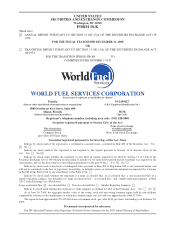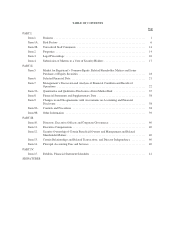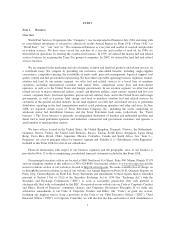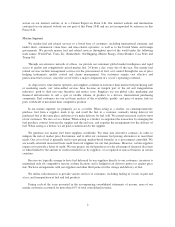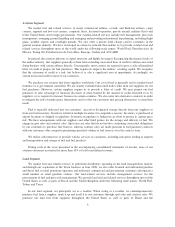World Fuel Services 2008 Annual Report Download - page 16
Download and view the complete annual report
Please find page 16 of the 2008 World Fuel Services annual report below. You can navigate through the pages in the report by either clicking on the pages listed below, or by using the keyword search tool below to find specific information within the annual report.• energy conversation efforts;
• price and availability of alternative fuels; and
• weather.
A rapid decline in fuel prices could adversely affect our profitability due to our average costing
methodology which may cause our inventory value to be higher than market resulting in our inventory being
marked-to-market, and the inventory itself may ultimately have to be sold at lower prices. If fuel prices increase,
our customers may not be able to purchase as much fuel from us because of their credit limits, which could also
adversely impact their businesses sufficiently to cause them to be unable to make payments owed to us for fuel
we permitted them to purchase on credit. They may also choose to reduce the amount of fuel they consume in
their operations to reduce costs. There would be no assurance that the volume of orders from our customers
would increase again or that we would be able to replace lost volumes by courting new customers. In addition, if
fuel prices increase, our own credit limits could prevent us from purchasing enough fuel from our suppliers to
meet our customers’ demands or could require us to use so much cash for fuel purchases as to impair our
liquidity.
We maintain fuel inventories for competitive reasons. Because fuel is essentially a commodity, we have no
control over the changing market value of our inventory. Our inventory is valued using the average cost
methodology and is stated at the lower of cost of market. Accordingly, if the market value of our inventory was
less than our average cost, we would record a write-down of inventory and a non-cash charge to cost of revenue.
In addition, we may not be able to sell our inventory at the market value or average cost reflected in our financial
statements at any given time.
Economic, political and other risks associated with international sales and operations could adversely
affect our business and future operating results.
Because we resell fuel worldwide, our business is subject to risks associated with doing business
internationally. Our business and future operating results could be harmed by a variety of factors, including:
• trade protection measures and import or export licensing requirements, which could increase our costs
of doing business internationally;
• the costs of hiring and retaining senior management for overseas operations;
• difficulty in staffing and managing widespread operations, which could reduce our productivity;
• unexpected changes in regulatory requirements, which may be costly and require significant time to
implement;
• laws restricting us from repatriating profits earned from our activities within foreign countries, including
the payment of distributions;
• political risks specific to foreign jurisdictions; and
• terrorism, war, civil unrest and natural disasters.
In particular, we operate in emerging markets, such as Russia and certain countries in Asia and Latin
America, which have been plagued by corruption and have uncertain regulatory environments, both of which
could have a negative impact on our operations there. Many countries in which we operate historically have been
and may continue to be susceptible to recessions or currency devaluation.
Fluctuations in foreign exchange rates could materially affect our reported results.
The majority of our business transactions are denominated in U.S. dollars. However, in certain markets,
payments to some of our fuel suppliers and from some of our customers are denominated in local currency. We
also have certain liabilities primarily for local operations, including income and transactional taxes, which are
8



